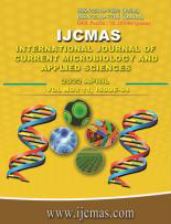


 National Academy of Agricultural Sciences (NAAS)
National Academy of Agricultural Sciences (NAAS)

|
PRINT ISSN : 2319-7692
Online ISSN : 2319-7706 Issues : 12 per year Publisher : Excellent Publishers Email : editorijcmas@gmail.com / submit@ijcmas.com Editor-in-chief: Dr.M.Prakash Index Copernicus ICV 2018: 95.39 NAAS RATING 2020: 5.38 |
Now a day’s interest of agro-industrial research and development towards oilseed crops as projects has increased in recent years. Private company shows potential interest in Safflower crop mainly due to fatty acid content and variability in the seed oil. The aim of this study was to assess the agronomic performance of 5 new safflower accessions together with safflower variety A-1 & PBNS-12, used as a check, in a rainfed environment. The research was carried out at Research Farm of AICRP on Safflower, VNMKV, Parbhani during rabi season of 2019-20. The experiment included 3 replications with 21 treatments and 63 experimental units, and it included the main plots were assigned to fertilizer levels and sub plots to safflower genotypes. The experimental results revealed that application of fertilizer levels F3 (90:60:00 kg NPK ha-1) and F2 (60:40:00 kg NPK ha-1) recorded significantly higher seed yield, straw yield, biological yield and oil yield than application of fertilizer level F1 (30:20:00 kg NPK ha-1). Among various safflower genotypes, genotype PBNS-12 (G7) recorded highest seed yield however, it was found at par with genotype ANG-17-102 (G5) and SSF-16-02 (G2) and found significantly superior over rest of the genotypes. Interaction effect of fertilizer levels and safflower genotypes in respect of above parameters was not found significant. This study confirms response of safflower for fertilizer applications, offering increase in seed yield, oil yield in rainfed regions.
 |
 |
 |
 |
 |